Sidamo, Ethiopia Sunshine [Sakui] Micro-production area Hambella Humbela Manor Shengshi Village
Professional coffee knowledge exchange more coffee bean information please follow the coffee workshop (Wechat official account cafe_style)
According to the Ethiopian decree, there are three coffee export systems: (1) the largest private processing plant system that has been exported through ECX bidding; (2) the cooperative system; and (3) the single farm system. In these three systems, cooperatives and single estates can be exported directly without competitive bidding through ECX, which can be said to have completely reliable traceability / product curriculum vitae (traceability).
However, if we get to the bottom of the matter, the cooperative is, after all, a centralized treatment of cherries harvested by small farmers, not 100% traceable. After all, a single farm is the only possibility of moving forward to the next generation.
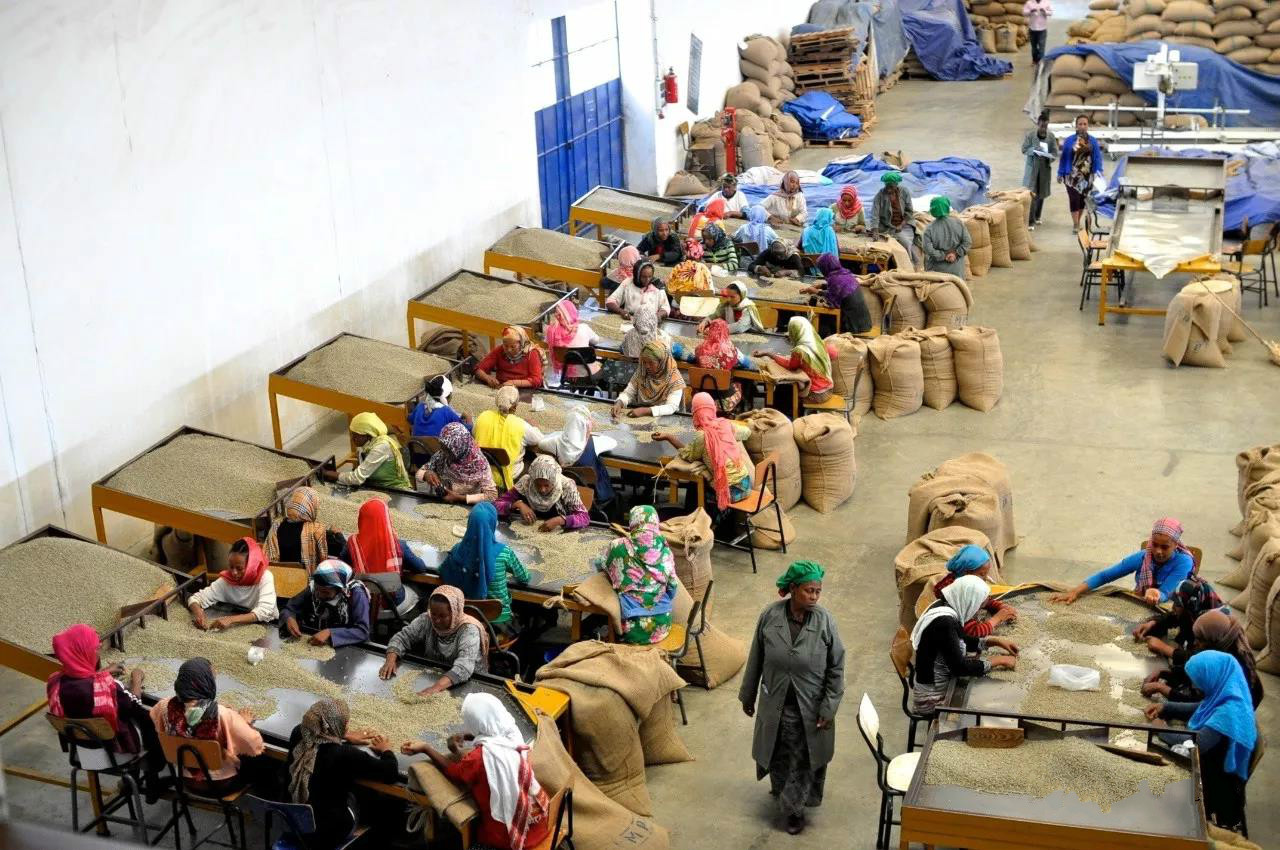
Ethiopia Commodity Exchange
The Ethiopian Commodity Exchange (the Ethiopia Commodity Exchange, hereinafter referred to as ECX) was founded in 2008 by Eleni Gabre-Madhin, a former senior economist at the World Bank (World Bank) and director of the International Food Policy Research Institute (IFPRI). The original purpose of ECX is to establish the first commodity exchange in Ethiopia and Africa, through the introduction of pricing mechanism, warehousing logistics, instant messaging and other modern trading rules and technologies to change the situation of high transaction risk and high transaction cost in the Ethiopian agricultural market, and build an effective, reliable and transparent commodity market.
ECX was widely praised at the beginning of its creation as a way to transform Ethiopian agriculture and reduce famine and poverty. In the past, Ethiopian farmers often claimed in the overwhelming media coverage that ECX provided market access to more than 2.4 million small farmers through rural cooperatives.
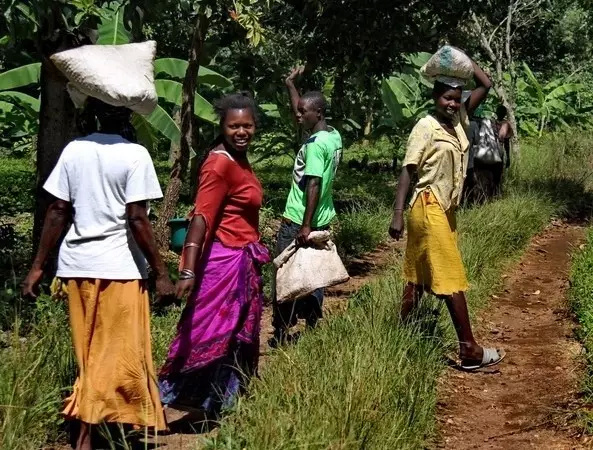
The way ECX deals with coffee goes something like this: first, farmers sell coffee berries to local washing plants, some of which pay higher prices for better quality coffee berries. The washing plant will send the processed raw beans to the warehouse of the delivery station.
ECX is equivalent to a "distribution center" and does the following:
1. The price is better guaranteed, it buys coffee beans from coffee farmers at constant and relatively favorable prices, and then hoards them.
two。 Coffee is graded, and the best has the highest price.
3. With timely information, coffee farmers can immediately get the transaction price, regional processing station, regional coffee warehouse and other information by phone.
4. Warehousing and processing plants have been set up. As of 2012, Ethiopia has 56 warehouses in 17 locations, 9 of which have coffee warehouses, reducing transport costs.
Take the Yega Snow Coffee area as an example, the delivery station is Dila, and raw beans are labeled according to the producing area and graded according to their quality and test results. The higher the overall quality, the higher the selling price. Traders buy raw beans through ECX, but at most, producing areas and villages are marked on the packaging, such as "Yega Xuefei: Konga" (Yirgacheffe: Konga). Yega Sheffield: Cochel (Yirgacheffe: Kochere)
Name and introduction of Coffee Cooperative in Ethiopia
Farmers' Cooperative Union Farmers' Cooperative Union
In order to facilitate the direct export of farmers' cooperatives, farmers' cooperatives in various places have gathered and formed their own cooperative alliances. There are now six cooperative alliances (Farmers' Cooperative Union) in Ethiopia, namely
● Oromia Coffee Farmers Cooperative Union (OCFCU)
● Sidama Coffee Farmers Cooperative Union (SCFCU)
● Yirgacheffe Coffee Farmers Cooperative Union (YCFCU)
● Kafa Forest Coffee Farmers Cooperative Union (KFCFCU)
● Bench Maji Coffee Farmers Cooperative Union (BMCFCU)
● Tepi Coffee Farmers Cooperative Union (TCFCU)
The advantage of cooperative alliance is to combine scattered small farmers and cooperatives to form a large collective, to participate in international projects, such as Firetrade, to provide a unified export to contact buyers, and a certain proportion of the harvest will be paid to cooperatives. Cooperatives deduct management costs, retain part for community development, and pay the rest to small farmers, so that small farmers can get more stable and convenient income. To cope with the cost of planting and living, this is why more and more small farmers are willing to join cooperatives.
Sigiga Cooperative (1600-2500 m)
Production area: Gedeo-Kochere Kochel
Number of members: 1862
Land attribute: red brown soil
Certificate: Fair Trade Fair Trade, UTZ Sustainable cultivation, Organic Organic Coffee
Finchewan Cooperative (1450-2000 m)
Production area: Gedeo-Wenago vena fruit
Number of members: 1271
Land attribute: red brown soil
Certificate: Fair Trade Fair Trade, Organic Organic Coffee
Konga Conga Cooperative (1750-2300 m)
Production area: Gedeo- Yega Xuefei
Number of members: 1556
Land attribute: red brown soil
Certificate: Fair Trade Fair Trade, Organic Organic Coffee
Hafursa Cooperative (1750-2300 m)
Production area: Gedeo- Yega Xuefei
Number of members: 1975
Land attribute: red brown soil
Annual output of raw coffee beans: 798000 kg
Average farm size: up to 4 hectares with an annual yield of about 600 kg per hectare
The cooperative has a washing station.
Certificate: Fair Trade Fair Trade, Organic Organic Coffee
Resa Cooperative (1000-1400 m)
Production area: Gedeo-Wenago vena fruit
Number of members: 2719
Land attribute: red brown soil
Two sets of coffee processing equipment are available.
Certificate: Fair Trade Fair Trade, Organic Organic Coffee
Addis Katema Cooperative (1000-1400 m)
Production area: Gedeo-Wenago vena fruit
Number of members: 891
The cooperative has a washing station.
Land attribute: red brown soil
Certificate: Fair Trade Fair Trade, Organic Organic Coffee
Biloya Biloya Cooperative (1600-2500 m)
Production area: Gedeo-Kochere Kochel
Number of members: 1203
Land attribute: red brown soil
Provide two sets of coffee processing equipment
Certificate: Fair Trade Fair Trade, Organic Organic Coffee
Worka Waka Cooperative (1650-2700 m)
Production area: Gedeb
Number of members: 305
Land attribute: red brown soil
Annual output of raw coffee beans: 457000 kg
Average farm size: maximum 4 hectares, annual yield of about 699 kg per hectare
The cooperative has all the processing equipment.
Certificate: Fair Trade Fair Trade, Organic Organic Coffee
Koke Cook Cooperative (1750-2300 m)
Production area: Gedeo- Yega Xuefei
Number of members: 828
Land attribute: red brown soil
A set of processing equipment can be provided
Certificate: Fair Trade Fair Trade, UTZ Sustainable cultivation, Organic Organic Coffee
Hama Cooperative (1600-2500 m)
Production area: Gedeo-Kochere Kochel
Number of members: 1505
Land attribute: red brown soil
A set of processing equipment can be provided
Certificate: Fair Trade Fair Trade, Organic Organic Coffee
Chichu Cooperative (1410-2000 m)
Production area: Gedeo-Dila
Number of members: 1675
Land attribute: red brown soil
Average farm size: up to 4 hectares, with an annual yield of about 591 kg per hectare
A set of processing equipment can be provided
Certificate: Fair Trade Fair Trade, Organic Organic Coffee
Michile Cooperative (1410-2000 m)
Production area: Gedeo-Dila
Number of members: 1206
Land attribute: red brown soil
Average farm size: annual yield per hectare is about 592 kg
A set of processing equipment can be provided
Certificate: Fair Trade Fair Trade, UTZ Sustainable cultivation, Organic Organic Coffee
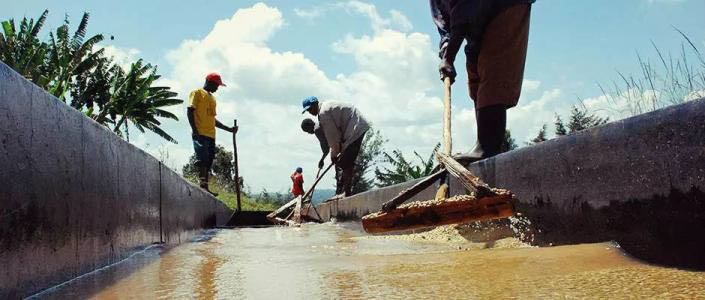
Hase Haro Cooperative (1450- 2000m)
Origin: Gedeo-Wenago
Number of members: 1,519
Land attribute: Red Brown Soil
Average farm size: maximum 4 hectares, annual yield of approximately 591 kg per hectare
One set of treatment devices available
Certificate: Fair Trade, Organic Coffee
Dumerso Cooperative (1750-2300 m)
Production area: Gedeo-Yejia Shefei
Number of members: 246
Land Attribute: Red Brown Soil
Two sets of treatment devices available
Certificate: Fair Trade, Organic Coffee
Tumticha Cooperative (1410- 2000m)
Production area: Gedeo-Yejia Shefei
Number of members: 960
Land Attribute: Red Brown Soil
Two sets of treatment devices available
Certificate: Fair Trade, Organic Coffee
Aramo Cooperative (1750-2300 m)(90+ Clinique)
Production area: Gedeo-Yejia Shefei
Number of members: 2,254
Land attribute: Red Brown Soil
Two sets of treatment devices available
Certificate: Fair Trade, Organic Coffee
Edido Cooperative (1750- 2300m)
Production area: Gedeo-Yejia Shefei
Number of members: 1044
Land attribute: Red Brown Soil
One set of treatment devices available
Certificate: Fair Trade, Organic Coffee
Adame Cooperative (1000-1400 m)
Origin: Gedeo-Wenago
Number of members: 533
Land attribute: Red Brown Soil
One set of treatment devices available
Certificate: Fair Trade, Organic Coffee
Belekara Cooperative (1000-1400 m)
Origin: Gedeo-Wenago
Number of members: 685
Land attribute: Red Brown Soil
One set of treatment devices available
Certificate: Fair Trade, Organic Coffee
Adado Cooperative (1200-1700 m)
Production area: Sidamo-Bule
Number of members: 1,128
Land attribute: Red Brown Soil
One set of treatment devices available
Certificate: Fair Trade, Organic Coffee
Haru Cooperative (1200-1700 m)
Production area: Gedeo-Yejia Shefei
Number of members: 1,187
Land attribute: Red Brown Soil
One set of treatment devices available
Certificate: Fair Trade, Organic Coffee
In July 2017, two new coffee trade regulations could change this by giving coffee farmers the option to sell coffee beans to coffee processing plants within three days of their arrival at ECX warehouses.
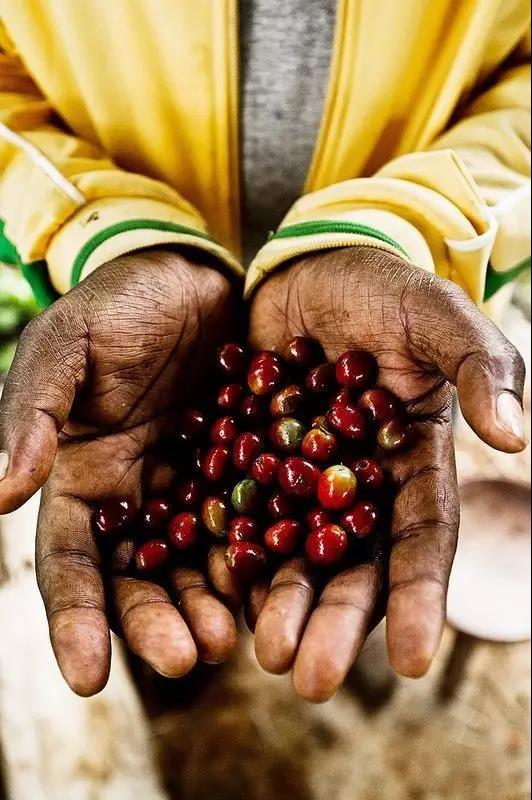
Barista single farm
In fact, the system has always existed in Ethiopia, but the proportion has not been high, and traditionally belongs to a large number of commercial batches that do not attach importance to quality. With Ethiopia's emergence in the third wave of boutique coffee in the past two or three decades, in addition to traditional coffee workers, Ethiopia is also gradually emerging a number of new people influenced by Western culture, hoping to bring changes to this industry. in addition to traditional exporters have devoted themselves to producing areas, but also attracted a number of craze to return from Europe and the United States to their hometown.
How important is the single farm system (we temporarily call it Single Farm Project, or SFP for short)? We all know that Ethiopia is mainly based on the smallholder system, but the smallholder system is impossible to achieve full traceability.
A single farm is the only answer to all these questions. The very important implementation concepts for the development of fine coffee, such as single variety batch, special treatment batch, customized batch, etc.
For example, the Sidamo Sunshine [Sakuran] bean of Qianjie Coffee belongs to a single farm, the micro-producing area of Hambella Humbera Manor.
Holy Lion Village, single Farm, Humbela Manor, Ethiopia
Ethiopia Hambela Benti Nenqua G1
Country: Ethiopia (Ethiopia)
Producing area: Oromia Region
Guji (Guji Zone)
Humbela (Hambela Woreda)
Holy Lion Village (Benti Nenqua Kebele)
Altitude: 2150 m (GPS measured height of the processing plant)
Variety: ancient excellent original species of Ethiopia (Heirloom)
Annual rainfall is about 1500-2000 mm
Processing plant: Humbela (Hambela)
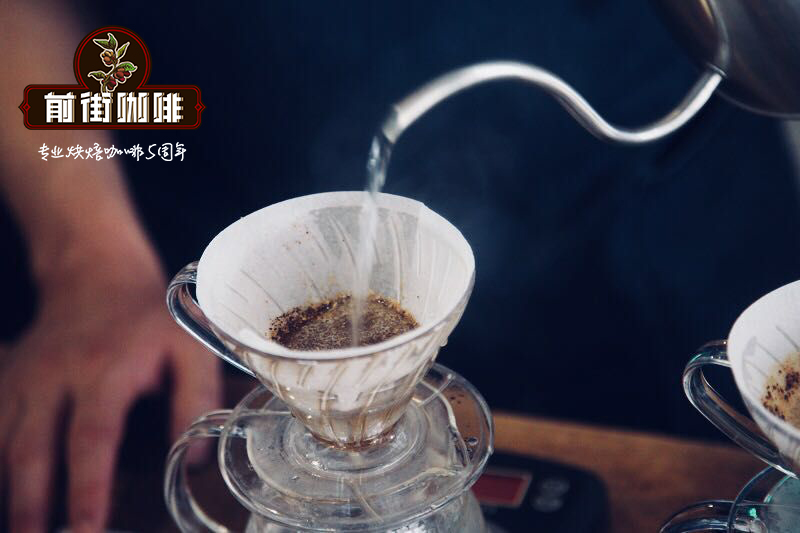
Qianjie coffee is suggested to be brewed by hand.
1. Filter cup: V60 filter cup
2. Water temperature: 89-91 ℃
3. Degree of grinding: moderate grinding
4. Ratio of powder to water: 1:15
5. Extraction time: about one minute and fifty seconds
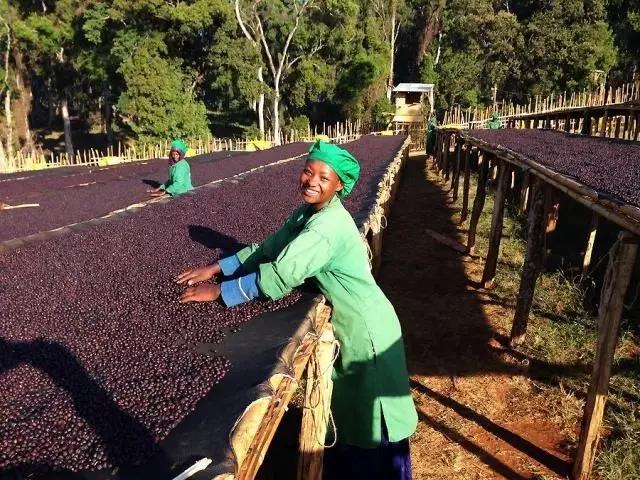
Important Notice :
前街咖啡 FrontStreet Coffee has moved to new addredd:
FrontStreet Coffee Address: 315,Donghua East Road,GuangZhou
Tel:020 38364473
- Prev
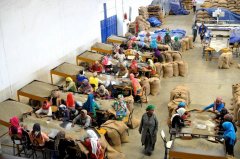
Ethiopian coffee trading system, coffee raw beans Sidamo sun [Sakuran] export system
According to the Ethiopian decree, there are three coffee export systems: (1) the largest private processing plant system that has been exported through ECX bidding; (2) the cooperative system; and (3) the single farm system. In these three systems, cooperatives and single manors can be exported directly without competitive bidding through ECX, which can be said to have completely reliable traceability / product resumes (traceability).
- Next
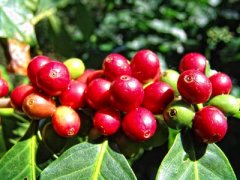
2017 Panamanian BOP champion-introduction to the flavor of Royal Pacamara Coffee at Don Julian Manor
Professional coffee knowledge exchange more coffee bean information please follow the coffee workshop (Wechat official account cafe_style) refined sun, Brazil COE third runner-up Shenmu Manor, Panama BOP first place Pacamara Panama Don Julian Pacamara won the best Panamanian coffee award for the seventh consecutive year! Run by Hea Burnesky, a very talented landowner in Panama, there are
Related
- Detailed explanation of Jadeite planting Land in Panamanian Jadeite Manor introduction to the grading system of Jadeite competitive bidding, Red bid, Green bid and Rose Summer
- Story of Coffee planting in Brenka region of Costa Rica Stonehenge Manor anaerobic heavy honey treatment of flavor mouth
- What's on the barrel of Blue Mountain Coffee beans?
- Can American coffee also pull flowers? How to use hot American style to pull out a good-looking pattern?
- Can you make a cold extract with coffee beans? What is the right proportion for cold-extracted coffee formula?
- Indonesian PWN Gold Mandrine Coffee Origin Features Flavor How to Chong? Mandolin coffee is American.
- A brief introduction to the flavor characteristics of Brazilian yellow bourbon coffee beans
- What is the effect of different water quality on the flavor of cold-extracted coffee? What kind of water is best for brewing coffee?
- Why do you think of Rose Summer whenever you mention Panamanian coffee?
- Introduction to the characteristics of authentic blue mountain coffee bean producing areas? What is the CIB Coffee Authority in Jamaica?

